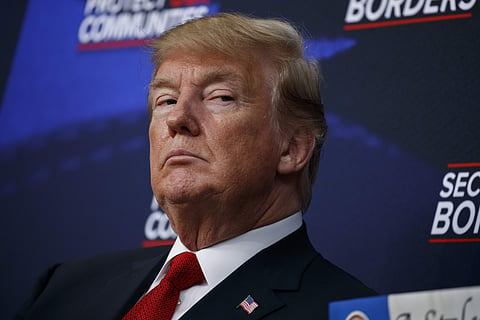

US President Donald Trump has ensured that the international focus has shifted to trade wars. India too is in the firing line. While steel and aluminium exports from India to the US will face higher duties, India has decided to hit back with tariff hikes on 29 products imported from the US. Right now, the impact is not much: the $240 million revenue gain from taxing US products will only match the losses India will suffer on exports to the US.
This is a small change compared to what is at stake on the US-China battlefront. From July 6, the first wave of US tariffs will hit $34 billion worth of Chinese products ranging from steel and clothing to digital gadgets. In retaliation, China is readying to tax American imports like agricultural produce and fruits. China’s reaction has only hardened Trump’s stand, who has threatened to extend 10 per cent tariff to a wider net of products worth $200 billion.
TARIFF HIKES
Two weeks ago, the US President attacked his mild-mannered ally and neighbour, Canada’s Prime Minister Justin Trudeau calling him “weak and dishonest”. Trump’s grouse is that Canada has a trade surplus of over $133 billion, yet imposes a tariff of 270 per cent on US dairy products. Later, at the G-7 meeting in Quebec, he attacked his EU allies too with his famous: “We’re like the piggy bank everyone is robbing.”
On March 1, when the US imposed the first round of tariffs of 25 per cent on steel and 10 per cent on aluminium, there was worldwide shock and dismay, especially among its European allies. But beyond the bluster, let there be no mistake Donald Trump is faithfully implementing his right wing election mandate of ‘Making America Strong Again’ with his ‘America First’ programme. Among his first acts after being sworn in as President was to exit the 12-nation trade alliance called the Trans-Pacific Partnership (TPP).
Blaming his allies and the rest of the world from benefitting from US’ $800 billion trade deficit, Trump is now determined to reverse the trend by erecting stiff tariff barriers against cheap imports and dumping, which he says will improve the lot of America’s “farmers, workers and taxpayers”.
A deeper analysis shows that Trump’s economics will neither benefit the US consumer nor the rest of the world. It is likely to trigger a general economic slowdown, something we have just begun to claw our way out of.
PROTECTION HIKES COSTS
Higher tariffs — 25 per cent on steel and 10 per cent on aluminium — will bring down the delicately built trade alliance with its allies and raise the price of goods that use steel and aluminium. This will hurt demand and investment both in America as well as in the exporting countries. Automakers, for instance, see a lowering of demand with prices rising, which means a slowdown in production and a reduction in jobs. The auto industry is an integrated product line in Canada, Mexico and the US, and to begin taxing parts based on where they originated from will be hugely disruptive. Besides, the US consumer has gotten used to mountains of affordably priced clothes, digital gadgets and toys from China, India and elsewhere, all of which are now threatened with higher tariffs.
Retaliatory tariffs by other countries like Canada, China and India will hit US farmers, dairy producers and fruit exporters in the US whose higher-priced goods will see rejection by consumers abroad. For exports to India, the retaliatory tariffs will mean American walnuts and almonds will cost 100 per cent more, chickpeas and Bengal gram 60 per cent and Californian apples 50 per cent. The flip side is these products will become ‘luxury’ items for Indian consumers.
Strangely, Harley-Davidson bikes, initially on the list for retaliatory taxes, have been dropped. Trump’s direct mention of the Harley facing 100 per cent duty may have prompted the Indian government to keep it off its tariff list as an olive branch offering. Finally, where is all this headed? Ending open trade, imposing protective tariffs and generally jacking up the price of goods are sure ways of suppressing demand and triggering a slowdown in the world economy. Demand has just seen an upswing with better employment and growth statistics. These ‘Trump-ian’ measures are threatening to derail recent progress.
There are both allies and factions in the US administration urging Donald Trump to change course. Even India has postponed its retaliatory tariffs till August 4 to give time to a visiting US trade team to do a rethink. Hopefully saner counsel will prevail.